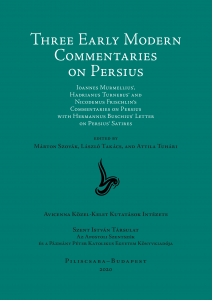
Three Early Modern Commentaries on Persius: Ioannes Murmellius’, Hadrianus Turnebus’ and Nicodemus Frischlin’s Commentaries on Persius with Hermannus Buschius’ Letter on Persius’ Satires
Edited by: Szovák Márton, Takács László, Tuhári Attila
Studia Philologica VI.
Publication year: 2020
Number of pages: XXV + 216
Binding: hardcover
Language: latin, angol
ISBN: 978–963–2777–764
ISSN: 2063–3157
Aules Persius Flaccus was a Roman satire poet who lived in the 1st century AD (34-62). He left although not very long a significant oeuvre, approximately six hundred lines, the text of six satires and a 14-line introduction written in choliambus. Despite its small size, this corpus is still one of the most difficult to interpret ancient Latin poetic texts: the poet, who deceased very young, uses an extremely rich, refined metaphorical language rich in literary, philosophical, or historical references that is hard to understand without any explanation. The appearance of his works after his death made his poetry popular in one fell swoop, it became a school reading for which textual explanations had been written since ancient times. Its popularity was unbroken during the Middle Ages due to the linguistic richness of the works, its sometimes neck-wrapped poetry, and its strict Stoic ethical content related to Christian teachings, indicating that the Satires remained in more than 600 codices and kept about thirty, largely unpublished medieval and humanist commentaries. A significant part of these comments is still awaiting further scientific examination, but it is necessary to mention that from the early Middle Ages there was already a collection of explanations (Commentum Cornuti) attributed to the teacher of Persius, the Stoic philosopher Cornutus, which preserved certain elements of ancient commentary. The reliability of this was disputed by many Medieval and Humanist scholars, which was also the reason why they gladly wrote commentaries on Persius’ satires, on the other hand, these texts were also read at universities, where there were debates about the exact interpretation of the text. Due to Persius’ unbroken popularity, his works were published in several commentary editions from the 15th century. An although this intensity has decreased, it is unlikely to cease at all. However, seeing how much is still unreleased, we are determined to attempt to republish these texts for the first time, because these commentaries may still be interesting in many ways today. In the second volume of the series there are published the works of three prominent Western European scholars of the 16th century, of the Dutch Ioannes Murmellius (Johann Murmell, 1480–1519), of the French Hadrianus Turnebus (Adrien Turnèbe, 1512–1565), and of the German-born Philipp Nicodemus Frischlin (1547–1590).

 fdfdfd
fdfdfd